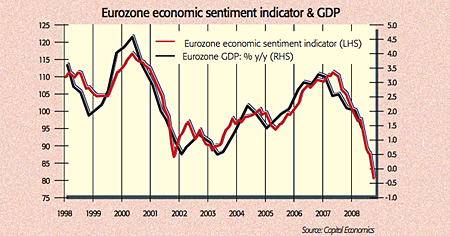Get the latest financial news, insights and expert analysis from our award-winning MoneyWeek team, to help you understand what really matters when it comes to your finances.
You are now subscribed
Your newsletter sign-up was successful
Want to add more newsletters?

Twice daily
MoneyWeek
Get the latest financial news, insights and expert analysis from our award-winning MoneyWeek team, to help you understand what really matters when it comes to your finances.

Four times a week
Look After My Bills
Sign up to our free money-saving newsletter, filled with the latest news and expert advice to help you find the best tips and deals for managing your bills. Start saving today!
"Grim." There's no other word for the European Commission's autumn economic outlook, says Matthew Curtin in The Wall Street Journal. It has given up on the idea that Europe could shrug off the global downturn and now says output in the eurozone is likely to have declined in the third quarter after shrinking in the second (two successive quarters of falling output marks a recession) and will expand by just 0.1% next year. Britain, meanwhile, is set to endure the worst slide in output next year of all EU countries, barring Estonia and Latvia.
Even this forecast of barely positive growth next year looks optimistic, given the latest awful data. German business confidence tumbled to a five-year low last month. A sub-index measuring expectations for the next six months was at its lowest since the early 1990s. A eurozone survey gauging executive and consumer confidence has plunged to a 15-year low. European retail sales have slid for five months in a row. Spanish car sales tumbled to a 13-year low last month as the burst housing bubble sent growth below the zero line. And eurozone manufacturing activity and export orders have sunk to record lows.
Moreover, says Capital Economics, the recent spike in interbank lending rates raises the risk of an even sharper slowdown in credit growth than we've seen so far; the credit crunch is yet to have "its full impact on domestic demand". Year-on-year growth in loans to households is already down to 4%. European interest rates are set to slide sharply, but this can't stop the eurozone economy contracting by 1% next year amid the worst global recession since 1945.
MoneyWeek
Subscribe to MoneyWeek today and get your first six magazine issues absolutely FREE

Sign up to Money Morning
Don't miss the latest investment and personal finances news, market analysis, plus money-saving tips with our free twice-daily newsletter
Don't miss the latest investment and personal finances news, market analysis, plus money-saving tips with our free twice-daily newsletter
As the recession takes hold, there are further losses ahead for banks. As Citigroup recently pointed out, corporate debt levels have risen sharply in the eurozone over the past few years and Ruth Sunderland in The Observer points to the fact that last year over 25% of corporate debt in Britain was accounted for by firms that don't make enough profit to service their interest bill.
Stephen Jen of Morgan Stanley says that European banks are five times more exposed to emerging markets than their US or Japanese counterparts. European banks account for $4.7trn of cross-border loans to emerging markets, according to Brown Brothers Harriman's Marc Chandler. Plunging currencies in eastern Europe in particular have highlighted the risk of default as local consumers who borrowed in foreign money face a squeeze on their income.
So far in this credit crisis we have seen "the damage banks wreaked on each other", as Sunderland puts it; now losses stemming from the weakening economy are on the cards. None of this bodes well for bank lending.

Yet stocks that miss their forecasts still take investors by surprise, says Tony Jackson in the FT. Shares in UK engineer GKN tumbled by 10% last week, even though the fact that car sales are collapsing is hardly news. And Ian Harnett of Absolute Strategy expects an overall profit slide of at least 50% as high margins contract: Europe remains vulnerable to earnings disappointments and another down-leg. Valuations may be cheap, but look set to get cheaper. As Tony Jackson puts it in the FT, "there is no reason to think the worst is over".
Get the latest financial news, insights and expert analysis from our award-winning MoneyWeek team, to help you understand what really matters when it comes to your finances.
MoneyWeek is written by a team of experienced and award-winning journalists, plus expert columnists. As well as daily digital news and features, MoneyWeek also publishes a weekly magazine, covering investing and personal finance. From share tips, pensions, gold to practical investment tips - we provide a round-up to help you make money and keep it.
-
 Should you buy an active ETF?
Should you buy an active ETF?ETFs are often mischaracterised as passive products, but they can be a convenient way to add active management to your portfolio
-
 Power up your pension before 5 April – easy ways to save before the tax year end
Power up your pension before 5 April – easy ways to save before the tax year endWith the end of the tax year looming, pension savers currently have a window to review and maximise what’s going into their retirement funds – we look at how

